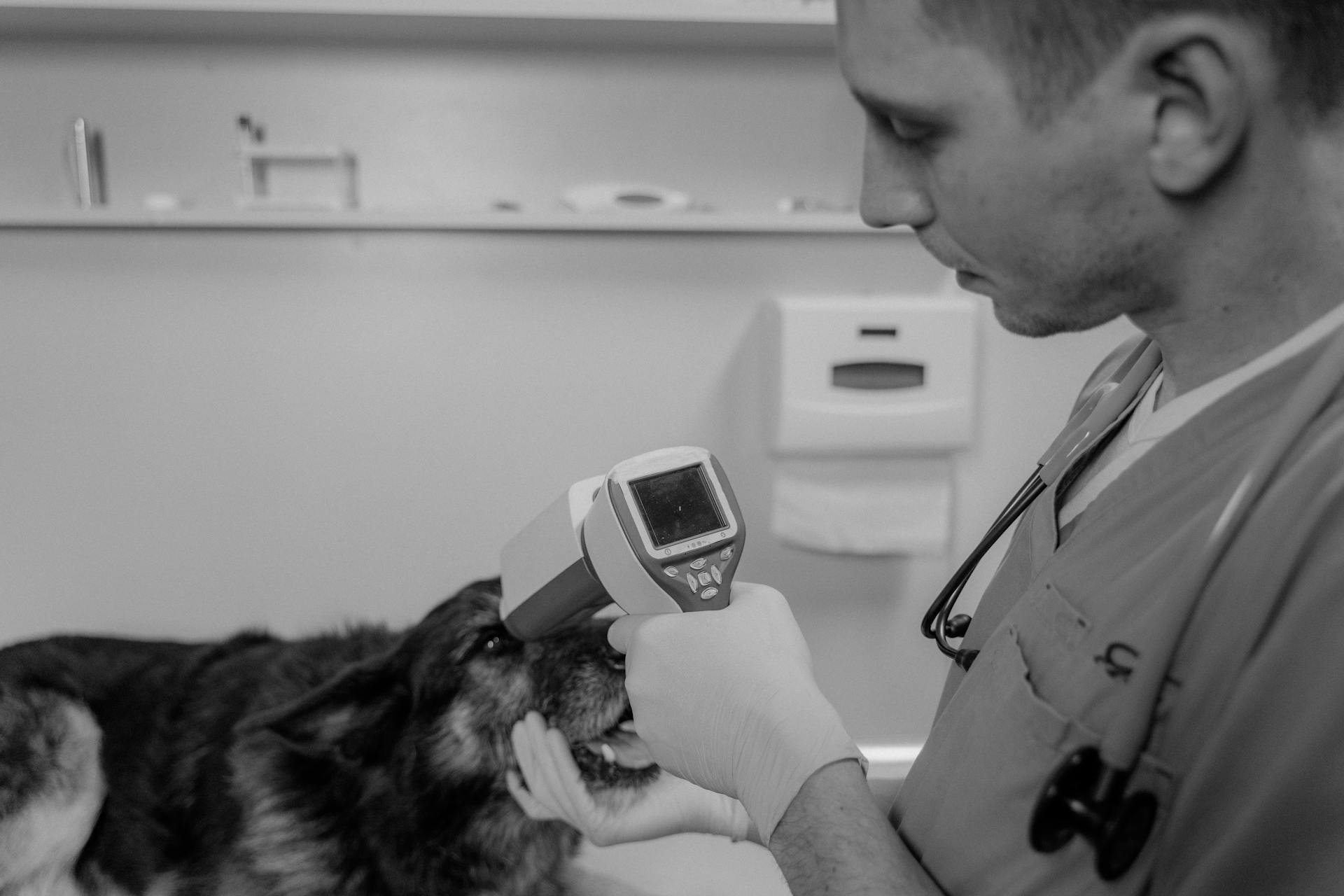
Searching for a lost dog can be a stressful experience, but with the right tools and registration, it doesn't have to be. By microchipping your dog and registering the chip with a reputable database, you can increase the chances of being reunited with your pet.
There are several databases to choose from, but the American Animal Hospital Association (AAHA) recommends using a database that is ISO-compliant and has a high success rate of reuniting pets with their owners. This ensures that your dog's microchip is linked to your contact information and can be easily accessed by shelters and veterinary clinics.
Registration is a crucial step in the process, as it allows you to provide up-to-date contact information and ensure that your dog's microchip is linked to your identity.
Registration and Update
Registration is a crucial step in ensuring your dog's microchip is effective in being reunited with you if they get lost. You need to register your dog's microchip after it is inserted, and make sure that it's registered by local shelters.
To register your dog's microchip, you'll need to enter their microchip ID number in the online registry provided by the microchip company. This number would have been provided to you when you adopted your dog from a shelter or had them microchipped at a vet or pet store.
You should always keep your dog's microchip ID number in an easy-to-find place, like along with their medical records or on your computer. Entering the microchip number in the registry won't give you your pet's location, but it can help you see if their chip has been scanned anywhere recently and allow you to mark your dog as lost in the system.
If you're unsure where to check your microchip or don't have the microchip ID number, you can contact your vet or the shelter where you adopted your dog. They will be able to give you the number if they inserted the chip.
Here are the steps to check and update your contact information with your pet's microchip registry:
1. Check the American Animal Hospital Association (AAHA) Microchip Lookup Tool to make sure your information is correct.
2. Update your contact information if you've moved or changed phone numbers.
Additional reading: Vet Dogs Dog Treats
3. Register your pet's microchip with the manufacturer's registry and with a universal registry like 24PetWatch.
Some registries are free, while others charge a one-time fee or a recurring fee for updates or transfers. For example, 24PetWatch is free to register, but you can also upgrade to a paid option.
Finding a Lost Dog
Finding a Lost Dog is a stressful and overwhelming experience, but there are ways to increase your chances of being reunited with your furry friend. Even if your dog's microchip can't help you track them, you can still find a lost microchipped dog by being proactive in searching for them.
You should enter your dog's microchip into the registry and stay active in searching for them. This will give you the best chance to find your lost microchipped dog.
You can start by putting up flyers online or handing them out around town, but there's more you can do. For example, you can call the local animal shelters and pet hospitals to report your dog missing.
Check this out: Lost Dog Search
Protecting your pet with around-the-clock support, lost pet alerts, and easily accessible health records can also help in case your pet goes missing. This service can be as low as $5/month.
If you're lucky, your vet or a shelter worker may have access to a tool like Peeva's Microchip, which can instantly notify you with your pet's location details if they're scanned for a microchip.
However, if you're not so lucky, finding owner information can be a long and confusing process. There's no singular national database in the United States, so you can register any brand of a microchip with any registry.
Dog Chip Search Process
If you're looking to start the dog chip search process, the first step is to ensure your dog's microchip is registered. Even after you've entered your dog's microchip into the registry, you should still be active in searching for them.
You can check your microchip by contacting your vet or the shelter where you adopted your dog, they will be able to give you the microchip ID number if they inserted the chip. If you can't get the ID number this way, your vet must scan the chip to find the number and look up the provider.
Intriguing read: Tracking a Dog with a Chip
To get your pet scanned, visit a veterinary office, animal shelter, or pet store equipped with a universal scanner that can read all microchip frequencies. Ensure they can perform a scan by calling ahead.
Here are some things to know about the dog chip search process:
- There is no singular national database in the United States, which means you can register any brand of a microchip with any registry.
- You can submit the same microchip ID number in multiple registries.
- Even if the vet guesses the microchip brand correctly, that information may not help you find the owner.
If your pet has a Found Animals microchip, you can register it through the Found Animals website. If your pet has a microchip from a different brand, you'll need to contact the specific company to register it.
Lost Dog Reunification
Having your dog microchipped is a great first step, but it's not the only one. You also need to register your dog's microchip in a pet microchip registry.
You should still be active in searching for your lost dog, even after entering their microchip into the registry. This gives you the best chance to find your lost microchipped dog.
There's more to finding your lost dog than just putting up flyers and calling local shelters. For 15 ways to find your lost dog, read The Ultimate Guide to Find a Lost Pet now.
Properly registered and microchipped pets make life easier for local shelters and animal control. They also help keep shelters less full.
Your pet's safety and your peace of mind depend on registering their microchip and keeping your contact information up-to-date.
Chip Registration Details
You need to register your dog's microchip after it's inserted to ensure it can be matched with your contact information if they get lost.
The odds of finding your pup are up to 238% higher if your dog is microchipped and registered.
To register your microchip, you'll need to use the online registry provided by your vet or shelter, and enter your dog's microchip ID number.
You should always keep your dog's microchip ID number in an easy-to-find place, like with their medical records or on your phone.
Entering the microchip number in the registry won't give you your pet's location, but it can help you see if their chip has been scanned anywhere recently and allow you to mark your dog as lost in the system.
If you adopt a dog from a previous owner, their microchip could potentially be unregistered, so it's a good idea to use the microchip's lookup tool to ensure it's registered.
Newer microchips by Save This Life include an indestructible metal collar tag stamped with a number, which can be used to quickly look up your contact information and location if your dog is found.
Chip Search Tools and Services
The AAHA Universal Pet Microchip Lookup Tool is a must-try when searching for a lost pet.
It's a free tool that lets you search for a microchip number in major registries, and it can tell you within seconds if the chip is registered.
You can find the tool at petmicrochiplookup.org, and it's a great resource to have when trying to locate a lost dog.
The tool doesn't store pet owner contact information, but it can show you the registry's information, including the company's website and phone number.
If the chip isn't registered in any participating registries, the tool will point you in the direction of possible manufacturers.
Not every registry participates in the tool, so it's essential to check if the one your pet is registered with is on the list.
Some registries, like AVID, don't participate in the tool, so make sure to contact them directly if your pet is registered with them.
You can also try contacting the manufacturer of the microchip if it's not registered with any participating registries.
Additional reading: Tracking Chip Dog
Sources
- https://www.paolivet.com/pet-microchipping/find-your-lost-microchipped-dog/
- https://www.foundanimals.org/aaha-universal-pet-microchip-lookup-tool/
- https://www.preventivevet.com/dogs/how-to-update-your-pets-microchip
- https://peeva.co/resources/check-your-pets-microchip/
- https://www.savinganimalstoday.org/microchip/
Featured Images: pexels.com


